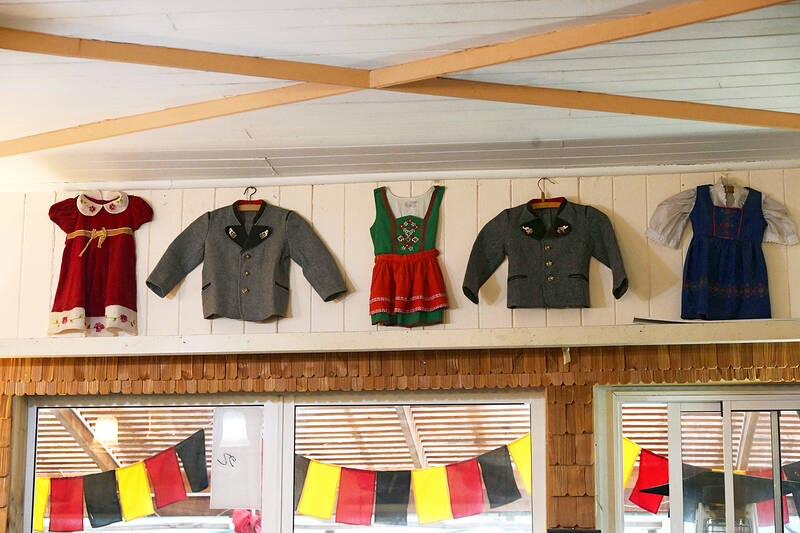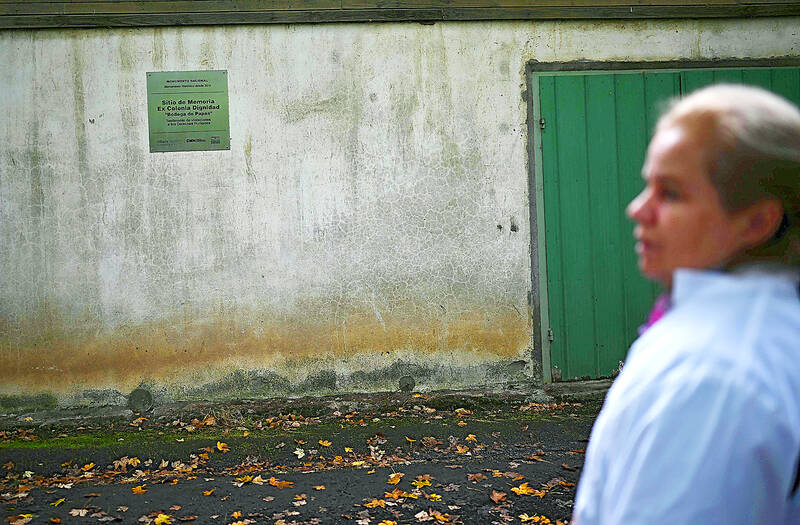With its pristine swimming pool, manicured lawns and lush forest backdrop, Villa Baviera, a German-themed settlement of 122 people in southern Chile, looks like the perfect holiday getaway.
However, Colonia Dignidad, as it was previously known, is a byword for horror, as the former home of a brutal cult that was used for torturing and killing dissidents under the dictatorship of Augusto Pinochet.
Twenty years after the cult leader, former Nazi German soldier Paul Schaefer, was jailed for the sexual abuse and torture of children at the colony, the Chilean state wants to turn it into a memorial for the victims of the country’s 1973 to 1990 dictatorship.

Photo: AFP
Chilean President Gabriel Boric in June last year ordered 116 hectares of the 4,800-hectare site, an area including the residents’ homes, a hotel, a restaurant and several food processing factories, be expropriated to make way for a center of remembrance.
Some of the inhabitants, who were separated from their families as children, subjected to forced labor, and in some cases sexually abused, say they are being victimized all over again.
Schaefer founded Colonia Dignidad in 1961 as an idyllic German family village — but instead abused, drugged and indoctrinated the few hundred residents and kept them as virtual slaves.

Photo: AFP
The boundaries between abuser and abused were blurred, with the children of Schaefer’s sidekicks counting themselves among his victims.
Anna Schnellenkamp, the 48-year-old manager of the colony’s hotel and restaurant, said she “worked completely free of charge until 2005,” the year of Schaefer’s arrest. “So much work I broke my back.”
Several years ago, Schnellenkamp, whose late father, Kurt Schnellenkamp, was jailed for five years for being an accomplice to Schaefer’s abuse, finally found happiness.
She got married, had a daughter and started to create new, happier memories in the colony, where everyone still communicates in German, despite being conversant in Spanish.
“The settlers know every detail, every building, every tree, including where they once suffered and were forced to work,” she said.
About 3,200 people were killed and more than 38,000 people tortured during Chile’s brutal dictatorship. An estimated 26 people disappeared in Colonia Dignidad, where a potato shed, now a national monument, was used to torture dozens of kidnapped regime opponents.
Schaefer was captured in 2005 on charges of sexually abusing dozens of minors over nearly half a century. He died in prison five years later while in preventive custody. His arrest, and those of 20 other accomplices, marked a turning point for the colony, which had been rebranded Villa Baviera a decade previously.
Suddenly, residents were free to marry, live with their children, send them to school and earn a paycheck. Some of the settlers returned to Germany, while others stayed and built a thriving agribusiness and resort, where tourists can sample traditional German fare, such as sauerkraut.
Some residents say that Chile, which for decades turned a blind eye to the fate of the enclave’s children, wants to make them pay for the sins of their fathers.
“One feels a kind of revenge against us,” said Markus Blanck, one of the colony’s business directors, whose father was charged as an accomplice of Schaefer’s abuse, but died before being sentenced.
The government said the expropriations are in the public interest.
“There is a national interest here in preserving our country’s historical heritage,” Chilean Minister of Justice and Human Rights Jaime Gajardo said, adding that those expropriated would be properly compensated.
While several sites of torture under the Chilean dictatorship have been turned into memorial sites, Gajardo said the memorial at Villa Baviera would be the biggest yet, similar to those created at former Nazi concentration camps in Europe.

BRUSHED OFF: An ambassador to Australia previously said that Beijing does not see a reason to apologize for its naval exercises and military maneuvers in international areas China set off alarm bells in New Zealand when it dispatched powerful warships on unprecedented missions in the South Pacific without explanation, military documents showed. Beijing has spent years expanding its reach in the southern Pacific Ocean, courting island nations with new hospitals, freshly paved roads and generous offers of climate aid. However, these diplomatic efforts have increasingly been accompanied by more overt displays of military power. Three Chinese warships sailed the Tasman Sea between Australia and New Zealand in February, the first time such a task group had been sighted in those waters. “We have never seen vessels with this capability

A Japanese city would urge all smartphone users to limit screen time to two hours a day outside work or school under a proposed ordinance that includes no penalties. The limit — which would be recommended for all residents in Toyoake City — would not be binding and there would be no penalties incurred for higher usage, the draft ordinance showed. The proposal aims “to prevent excessive use of devices causing physical and mental health issues... including sleep problems,” Mayor Masafumi Koki said yesterday. The draft urges elementary-school students to avoid smartphones after 9pm, and junior-high students and older are advised not

Philippine President Ferdinand Marcos Jr has fired his national police chief, who gained attention for leading the separate arrests of former Philippine president Rodrigo Duterte on orders of the International Criminal Court and televangelist Apollo Carreon Quiboloy, who is on the FBI’s most-wanted list for alleged child sex trafficking. Philippine Executive Secretary Lucas Bersamin did not cite a reason for the removal of General Nicolas Torre as head of the 232,000-member national police force, a position he was appointed to by Marcos in May and which he would have held until 2027. He was replaced by another senior police general, Jose

POWER CONFLICT: The US president threatened to deploy National Guards in Baltimore. US media reports said he is also planning to station troops in Chicago US President Donald Trump on Sunday threatened to deploy National Guard troops to yet another Democratic stronghold, the Maryland city of Baltimore, as he seeks to expand his crackdown on crime and immigration. The Republican’s latest online rant about an “out of control, crime-ridden” city comes as Democratic state leaders — including Maryland Governor Wes Moore — line up to berate Trump on a high-profile political stage. Trump this month deployed the National Guard to the streets of Washington, in a widely criticized show of force the president said amounts to a federal takeover of US capital policing. The Guard began carrying